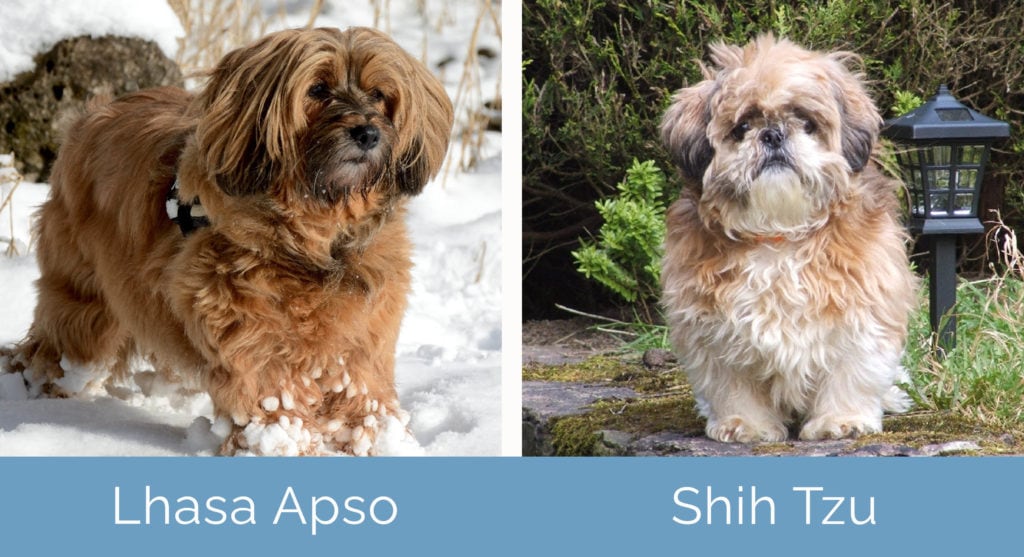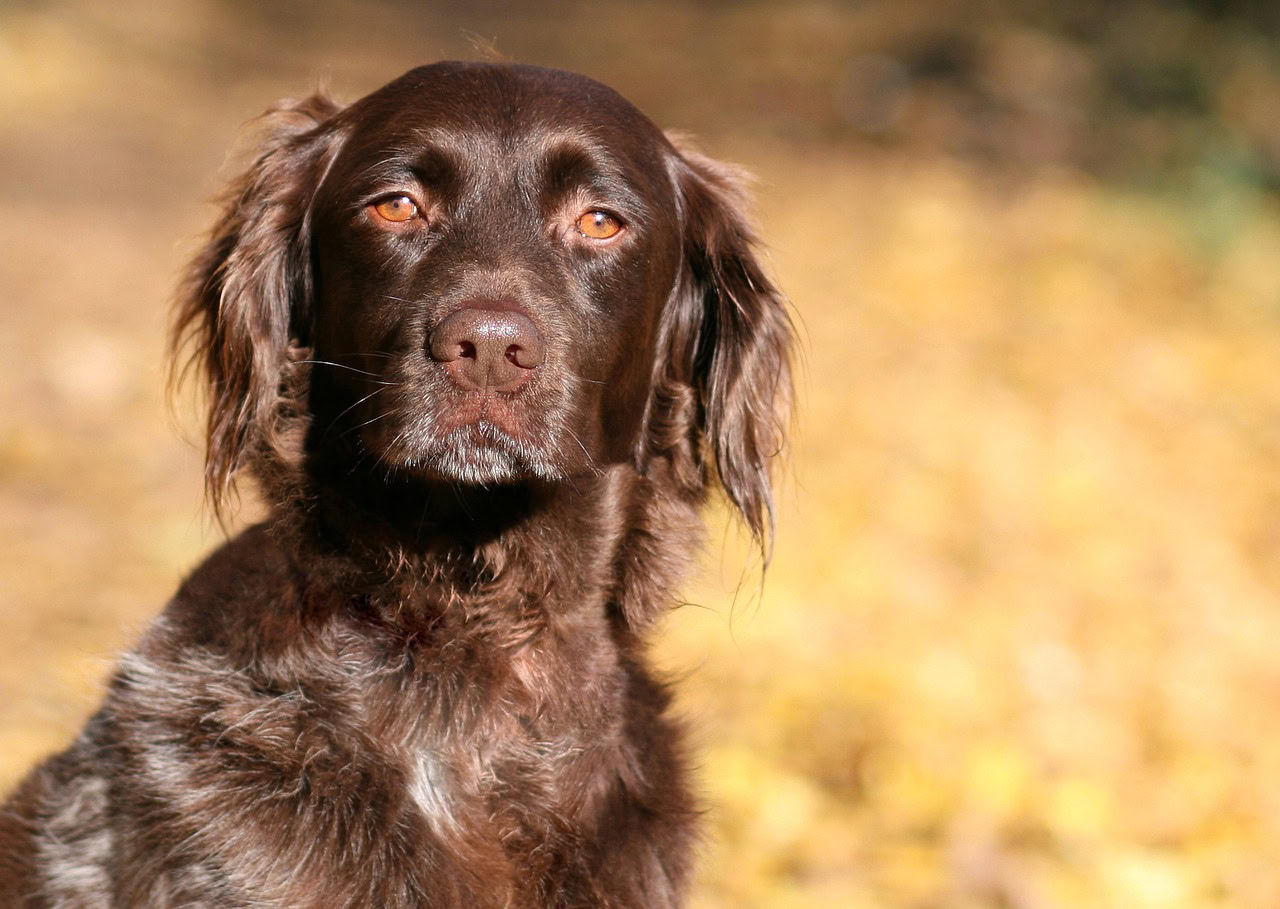Lhasa Apso vs. Shih Tzu: What’s the Difference?

Updated on

The Lhasa Apso and Shih Tzu both originate from Asia and share the same ancient bloodline. They are ancient breeds that were employed in monasteries as loyal guard dogs and companion animals. They are small canines and are fairly similar in appearance, with long silky coats and endearing eyes.
With all these similarities, the two breeds are often confused for each other, but there are a few differences to be aware of. So, what’s the difference between Shih Tzu and Lhasa Apso dogs? In this article, we’ll take a deeper look at what exactly those differences are.
 Lhasa Apso vs Shih Tzu: Visual Differences
Lhasa Apso vs Shih Tzu: Visual Differences

There is little to differentiate between these two dogs, and it’s no wonder that people confuse them! The Lhasa Apso is slightly larger than the Shih Tzu and has a longer and straighter coat. Their coat is typically black, gold, and white, while Shih Tzus can be found in a wide range of color combinations.
A Quick Overview
- Average height: 9–11 inches
- Average weight: 12–15 pounds
- Lifespan: 12–15 years
- Exercise needs: 1–2+ hours/day
- Grooming needs: High
- Family-friendly: Yes
- Dog friendly: Yes
- Trainability: Moderate
- Average height: 9–10 inches
- Average weight: 9–16 pounds
- Lifespan: 10–16 years
- Exercise needs: 1–2 hours/day
- Grooming needs: High
- Family-friendly: Yes
- Dog friendly: Yes
- Trainability: Excellent
 Lhasa Apso Overview
Lhasa Apso Overview

This Lhasa Apso originated in Tibet and were highly revered watchdogs and companion animals in the mountaintop monasteries. They got their name from the holy Tibetan city of Lhasa. They were initially reserved for nobility and monks only, and it was impossible to buy one for a long time. They were considered sacred and good luck charms and were only permitted to leave the country when given as a gift by the Dalai Lama, and they were always given in pairs.
Eventually, the rest of the world learned about these adorable dogs, and they were finally permitted to be sold and leave the country. Their popularity in the West has been steadily increasing ever since.
Personality
Lhasa Apsos are happy and playful animals that can also be mischievous but in a good way! They are revered for their loyalty, bred as alert watchdogs, and can be fiercely protective. They are sturdy and rugged dogs that are accustomed to harsh and cold climates and, consequently, don’t do well in hotter climates.
They are not overly energetic dogs and are happy to live indoors and are ideal for apartments and small homes without yards, provided they get adequate exercise. These dogs are fiercely loyal and become highly attached to their owners, and they do not enjoy being left alone for extended periods. This loyalty can also lead them to become overprotective around other dogs, but with adequate socialization, they are generally great with other dogs and pets.
Training and Exercise
The Lhasa Apso is generally an easy dog to train but has a definite independent and stubborn streak that can be difficult to break through. The best way to overcome this is by keeping training sessions short and fun and exercising your pup beforehand.
Lhasa Apsos are intelligent and have a long history of working closely with humans. Their loyal nature makes them eager to please their owners, and they usually pick up commands quickly. This makes reward-based methods the best technique for training them.
Early socialization is critical to good training, and your dog will be less distracted by sounds and other dogs and animals. Consistency and training at a young age are also vital; otherwise, your Lhasa Apso may quickly pick up bad habits that can be difficult to break.
Lhasa Apsos are known for having a long puppyhood and being late to mature, so although they are fully grown at around a year old, they will still have a puppy-like character well into adulthood.

Health and Care
Lhasa Apsos are a healthy breed in general and prone to few genetic issues, but they can suffer from conditions common to small breeds. These include patellar luxation and progressive retinal atrophy, and they are known to have problems with cherry eye, too.
These small dogs are easy to feed, and around 1 cup of good quality dry kibble per day, split into two meals, is ideal. They are highly food-motivated, and you should avoid free-feeding them. Like any dog, be sure they have access to clean, fresh water at all times.
Lhasa Apsos have beautiful, long, straight coats that need daily brushing to keep them knot and mat-free. They may require the occasional trimming, too, and you should get them used to grooming at a young age to prevent issues in the future.
Suitability
Lhasa Apsos are excellent family dogs, are easy for seniors to look after, and adjust well to apartment living, making them ideal companion animals. They can become overwhelmed by smaller children, so you’ll need to watch for nipping and explain to your children the correct way of interacting with these dogs. They have a slight stubborn streak that can make training a challenge, but not so much that they need an experienced owner. Lhasa Apsos are perfect for novices, too.
 Shih Tzu Overview
Shih Tzu Overview

Developed in Tibet in as early as 8,000 B.C., this ancient breed is one of the oldest on the planet, with references to them in early Chinese artwork and writing. They are said to have been given to Chinese royalty by Tibetan monks as gifts and were highly prized companion animals and still are today. These pooches are perfect companion animals and were recognized by the American Kennel Club in the late 1960s.
Personality
Shih Tzus are loving, affectionate, and loyal dogs that love nothing more than being close to their owners. They were bred and developed for centuries for companionship, and they do it well! While they have plenty of energy for a play session or a brisk walk around the neighborhood, don’t expect them to hunt or be good guard dogs.
They are the quintessential lapdog, and their long history of being close to humans makes them happiest when on their owner’s lap. They do not enjoy being alone and will suffer greatly from separation anxiety when left alone for long periods. If you are out at work frequently, the Shih Tzu is probably not the ideal pet for you.
They are friendly and affectionate dogs that make instant friends with new faces, whether humans, dogs, or even cats! Indeed, your felines and other small pets are safe with the Shih Tzu since they have a low prey drive and hunting instinct and will make friends with your cat before trying to chase it.
Training and Exercise
While Shih Tzus love to lounge on the lap of their owners above almost all else, they are not complete couch potatoes. They love to play and will love their daily walk and training sessions. They are content with short walks and play sessions and are comparatively low-maintenance dogs in terms of exercise. One point to remember is that they are sensitive to heat, and you’ll need to take care in warmer climates.
Training a Shih Tzu is a breeze: Their eagerness to please and love of human interaction allows them to quickly pick up basic commands. Be sure to avoid harsh training methods or reprimands because Shih Tzus are rather sensitive. Reward-based methods are ideal. House training can sometimes be an issue, but by using positive reinforcement techniques and a bit of patience, this shouldn’t be an issue.
Although these dogs are easy-going and friendly, early socialization and training are essential to ensure they don’t pick up any bad habits that can be difficult to reverse later.

Health and Care
Shih Tzus do not have any significant genetic issues to be aware of, but they are known to suffer from minor issues, including eye problems, allergies, and ear infections. They are also prone to a few issues that affect smaller breeds, including hip dysplasia and patellar luxation.
They are highly adaptable to apartment living and content to live in small homes as long as they get adequate exercise and are close to their owners. Their long coat needs daily brushing to avoid knotting and matting, and they’ll love the process! Small breeds are often prone to dental issues, so be sure to regularly brush their teeth to avoid plaque and tartar build-up.
Around 1 cup of high-quality dog food per day, split into two meals, is ideal for a Shih Tzu. Be sure not to free-feed them because they are prone to getting overweight since they are not very active.
Suitability
Shih Tzus are good family pets, ideal companions for singles and seniors, and highly adaptable to apartment living. They need a great deal of attention, so they are not suitable for owners who are away frequently.
 What are the differences?
What are the differences?
These two breeds are similar both in appearance and in character. They are expert lapdogs and companion animals, are easy to look after and care for (other than their luxurious coats), and are adaptable to most living situations. Both are great for novice owners because they are easy to train, too. If you want a new companion lapdog, either breed is a great choice.
The main difference is the Shih Tzu’s need for affection and attention, and they do not enjoy being alone at home, even with other dogs, as they get closely attached to their owners. While Lhasa Apsos do not favor this either, they may be the better choice if you are away for extended periods. If this is not an issue and you have other small pets at home, Shih Tzus are a great choice due to their friendliness and low prey drive, but the Lhasa’s loyalty may cause issues around other pets.
See also:
- Pomeranian vs Shih Tzu: Pick the Right One for You!
- Lhasa Apso Vs Havanese: How Are They Different? (With Pictures)
Featured Image Credit: (L) otsphoto, Shutterstock | (R) Dieny Portinanni, Unsplash
 Lhasa Apso vs Shih Tzu: Visual Differences
Lhasa Apso vs Shih Tzu: Visual Differences Lhasa Apso Overview
Lhasa Apso Overview Shih Tzu Overview
Shih Tzu Overview What are the differences?
What are the differences?








